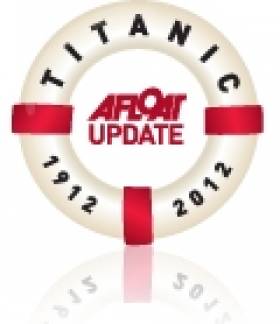Displaying items by tag: River Class Patrol vessels
Royal Navy Attend Presidential Fleet Review for Cobh Titanic 100
#COBH TITANIC 100 - Following President Michael D. Higgins visit to Cobh to commemorate the centenary call of RMS Titanic to Queenstown, the town yesterday hosted a Naval Service review that included the Royal Navy's HMS Mersey.
The President as supreme commander of the Defence Forces boarded the Naval Service 'flagship' L.E. Eithne which passed the guest-ship, a River class patrol vessel which headed a line of vessels which lay at anchor of Cobh's waterfront, they were the L.E. Aoife, L.E. Aisling and L.E. Niamh
The historic event which marked the pinnacle of the Titanic 100 Cobh centenary week will continue as part of a year-round programme of events. For information visit www.titanic100.ie. On the homepage the L.E. Niamh features again, where on this occasion marine photographer Jehan Ashmore captured the vessel underway as she powered her way at high-speed through a misty Dalkey Sound.
Among the many places throughout Cobh where thousands of tourists have flocked since the Balmoral docked on Monday to retrace the liner's maiden voyage, has been the White Star Line pier.
From this pier were the last passengers to depart Queenstown on board the tenders PS Ireland and PS America to the ill-fated Titanic that struck an ice-berg. On her Irish call 123 passengers were transferred to the Titanic which lay outside Cork Harbour, while 7 passengers disembarked from the liner and headed ashore.
What remains of the pier which is not accessible to the public and is in danger of collapsing, there has been calls to raise funds to save the structure, as previously reported.
Also in attendance during yesterday's historic proceedings, was the excursion passenger tender Spirit if the Isles which is operating on her second season since starting Cork Harbour cruises last year. They run between Cork city quays and downriver along the Lee to Cobh.
In the 1980's the tender then named Ingot ran excursions from Dun Laoghaire Harbour into Dublin Bay and likewise of L.E. Niamh, she too transited Dalkey Sound as part of her sightseeing tours.
- RMS Titanic
- White Star Line
- Cobh Cruise Callers
- Cobh, Cork Harbour
- Cruiseships
- Balmoral
- FredOlsen Cruise Lines
- Titanic Memorial Cruise
- naval service
- LEEithne
- Royal Navy
- HMS Mersey
- President Michael D Higgins
- Queenstown,Ireland
- PS Ireland
- PS America
- Spirit of the Isles
- Cork Harbour Cruises
- Cork Harbour News
- Dalkey Sound
- LE Niamh
- LE Aoife
- LE Aisling
- Cork Harbour
- River Class Patrol vessels
- River Lee
- Irish marine photographers
























































